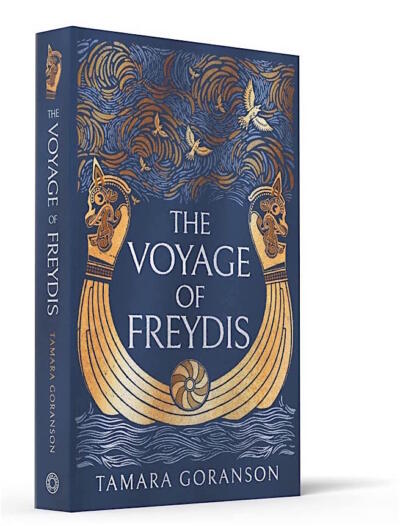1457 Dial the happy endings
The Voyage of Freydis: The Vinland Viking Saga, Book 1
by Tamara Goranson
Toronto: HarperCollins Canada (One More Chapter), 2021
$23.99 / 9780008495336
Reviewed by Myshara Herbert-McMyn
*
 Two things about the title of this novel, The Voyage of Freydis, struck me when I first came across it. Firstly, that it was a voyage. That word conjures many days and nights of hard travel, wandering and searching for a prize greater than anything you can imagine, and epic stories of heroes. Many great adventure novels tell tales of voyages and quests, each with a goal to achieve or return something of great value. J.R.R. Tolkien’s The Lord of the Rings and The Hobbit contain such journeys: returning the One Ring, or gaining back the Lonely Mountain and the treasure within. The second thing I noticed about the title of Tamara Goranson’s novel was the name Freydis. I didn’t recognize the name itself, but I knew that it was most likely Nordic. I could also tell that it was a woman’s name, which made the prospect of reading about her voyage even more interesting. It’s the perfect title for this novel, denoting neither success nor failure and instead ensuring that the focus is on Freydis’s voyage itself.
Two things about the title of this novel, The Voyage of Freydis, struck me when I first came across it. Firstly, that it was a voyage. That word conjures many days and nights of hard travel, wandering and searching for a prize greater than anything you can imagine, and epic stories of heroes. Many great adventure novels tell tales of voyages and quests, each with a goal to achieve or return something of great value. J.R.R. Tolkien’s The Lord of the Rings and The Hobbit contain such journeys: returning the One Ring, or gaining back the Lonely Mountain and the treasure within. The second thing I noticed about the title of Tamara Goranson’s novel was the name Freydis. I didn’t recognize the name itself, but I knew that it was most likely Nordic. I could also tell that it was a woman’s name, which made the prospect of reading about her voyage even more interesting. It’s the perfect title for this novel, denoting neither success nor failure and instead ensuring that the focus is on Freydis’s voyage itself.
Freydis Eiríksdóttir is a woman stuck in a horrible situation, married to a man who blatantly cheats on her with other women who live on his land and who physically abuses her. Despite her status as the daughter of Erik the Red and sister to Leif Eiríksson, Freydis is never believed when she brings up her concerns for her personal safety. After repeatedly being told that she has it better than others, and that she should be happy where she is, Freydis concocts a plan to leave her husband. Leif helps her hide away until she can get on a boat and sail to Vinland, hoping to escape him forever. And so, The Voyage of Freydis earns its name.

As a reader, I expected the plot of this novel to take a certain direction. I’m a fan of happy endings above anything else, so I was optimistic about Freydis’s fate. Spoiler alert: having reached the end of the novel, I can tell you that such optimism will only disappoint.
Freydis was not a likeable character. Some scenes show her acting like an intelligent woman ahead of her time, while in others she acts like a spoiled, bratty child. This contradiction frustrated me no end, since she seems to work against herself and her goal. Her husband is able to use her character inconsistencies against her when she accuses him of abuse. Freydis can’t seem to hold herself together when it is crucial for her survival to do so. It’s the age-old “excuse” : the woman is being emotional and “difficult,” and therefore shouldn’t be believed. As a woman, I was angered to see another woman doubted in this way, even a fictional one.
By contrast, the rest of the women in the novel seem like the early feminists I expected Freydis to be. Leif’s wife held a certain amount of command over their people, and the other Norsewomen are characterized as being equal to their husbands. I haven’t been in a situation like Freydis’s, but I would like to think that since this is a fictionalized story containing historical people about whom we don’t have very detailed information, there would be some wiggle room to give Freydis a happy ending, or at least hope for one, since other women in the book find stable and healthy relationships.
The men in The Voyage of Freydis are much more realistic to me. Freydis’s husband, Thorvard of Gardar, is a liar and cheat who beats his wife and sleeps with other women. He is a believable and convincing narcissist who uses a lot of the deceptive tactics I’ve read about in such men. His untrustworthy and unreliable behaviour benefits him, just as it often does for such men, unfortunately, in real life. The other men in the novel stand in contrast to Thorvard in their shows of honour, indeed most offer to challenge him to a duel for Freydis’s freedom. Seeing Thorvard for the abuser he was, and believing Freydis’s version of events, a few of them help Freydis escape on their ships.
 Freydis’s brother Leif is the oddity of the bunch, and I couldn’t understand his inconsistencies. Sometimes he supports her in helping her get away from Thorvard, but most of the time Leif treats her like an annoying child who complains about nothing. Leif emphasizes Freydis’s duty to her husband, and although technically being physically beaten by Thorvard is grounds for divorce, Freydis has no witnesses to stand for her, so attempting to divorce him is a fruitless endeavour. Overall, the men in The Voyage of Freydis are more complex characters than the women, and I think I would rather have read about the journeys of Leif and his wife or other viking voyages than Freydis’s tale of woe.
Freydis’s brother Leif is the oddity of the bunch, and I couldn’t understand his inconsistencies. Sometimes he supports her in helping her get away from Thorvard, but most of the time Leif treats her like an annoying child who complains about nothing. Leif emphasizes Freydis’s duty to her husband, and although technically being physically beaten by Thorvard is grounds for divorce, Freydis has no witnesses to stand for her, so attempting to divorce him is a fruitless endeavour. Overall, the men in The Voyage of Freydis are more complex characters than the women, and I think I would rather have read about the journeys of Leif and his wife or other viking voyages than Freydis’s tale of woe.
Despite the title of this novel containing the word “voyage,” it didn’t feel like one to me. Freydis travels across an ocean to reach Vinland — believed to be the coast of what is now Newfoundland in Atlantic Canada — but her personal journey doesn’t progress as she does so. Her character develops during her time with a different group of people in Vinland, but it seems to revert in the climax of the novel and she ends up where she began.
The Voyage of Freydis is a startling and frustrating story of a woman who doesn’t have any power over her own life. I hesitate to recommend a book that made me feel one of two ways: depressed or angry. I felt both of these emotions very strongly after finishing the novel. I kept throwing words around in my head, unsure of how to explain this novel without dissuading possible readers. I decided that The Voyage of Freydis might appeal to a specific group: readers of historical non-fiction, since fiction readers tend to prefer happy endings. If after reading this review, the story of Freydis and her hardships still sounds intriguing, I recommend giving it a try. Goranson’s writing itself is not difficult and the style fits the atmosphere of the novel. There are content warnings on one of the inner pages for a number of sensitive topics as well. The Vinland Viking Saga series continues for at least another two books, both to be published in the near future, but I doubt that I will continue with Goranson’s Viking saga. I learned a lot about my reading preferences from The Voyage of Freydis, and I thank Tamara Goranson for that. I think I’ll stick with happy endings.

*

Myshara Herbert-McMyn is a book reviewer and aspiring writer living in Kelowna. She runs the blog Lit&Leta. She holds a Bachelor of Arts in English and Creative Writing from Thompson Rivers University. Editor’s note: Myshara Herbert-McMyn has recently reviewed books by Gail Anderson-Dargatz, Samantha Knight, Shashi Bhat, Silvia Moreno-Garcia, S.M. Freedman, Sofi Papamarko, and John O’Neill for The British Columbia Review.
*
The British Columbia Review
Publisher and Editor: Richard Mackie
Formerly The Ormsby Review, The British Columbia Review is an on-line journal service for BC writers and readers. The Advisory Board consists of Jean Barman, Wade Davis, Robin Fisher, Cole Harris, Hugh Johnston, Kathy Mezei, Patricia Roy, Maria Tippett, and Graeme Wynn. Provincial Government Patron (since September 2018): Creative BC. Honorary Patron: Yosef Wosk. Scholarly Patron: SFU Graduate Liberal Studies.
“Only connect.” – E.M. Forster
5 comments on “1457 Dial the happy endings”